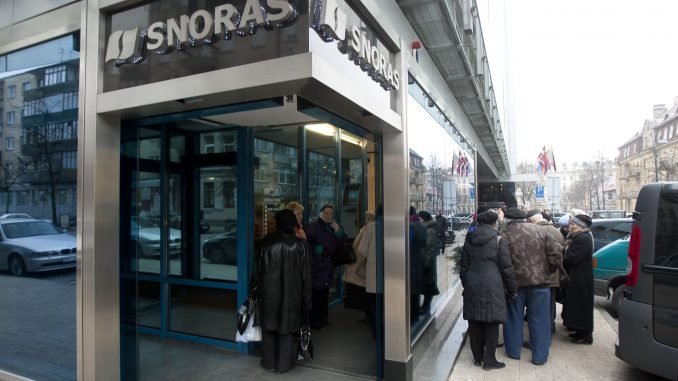
MP Arvydas Anušauskas
With the Seimas majority going after the Bank of Lithuania, we increasingly hear proposals to once more review the story of the Snoras bank’s bankruptcy. “This is a truly peculiar story,” the then credit union Vilniaus Taupomoji Kasa analyst, economist Stasys Jakeliūnas said in an interview seven years ago.
In the 2012 interview to ‘Valstiečių laikraštis’ [Farmer‘s Newspaper], S. Jakeliūnas stated that the story of Snoras is completely different, “Perhaps illegal activities did proceed in this bank, however it was not proven.” S. Jakeliūnas stated back then that he even noticed manifestations of information warfare against the bank’s shareholders, with them being “demonised.” At the time, this claim meant nothing and no one knew whether economist S. Jakeliūnas truly does want to represent the positions of Snoras shareholders Vladimir Antonov and Raimondas Baranauskas.
Let me remind those who do not know and did not want to know that all eight years up to its bankruptcy in 2011, Snoras would keep receiving demands to rectify flaws every year. Up until it turned out that the bank’s declared securities had been transferred to the bank’s shareholders’ accounts. Later the securities were traded for loans in untaxed zones. Thus, a billion litas landed ini Swiss banks and not the account of the bank but those of Antonov and Baranauskas, with another 1.3 billion litas landing in the Cayman and Virgin Islands, also being transferred to other structures, also potentially linked to these shareholders.
The Snoras bank’s commitments grew 2.8 billion litas larger than its property. The bank also had sold uninsured deposit certificates and obligations to around 14 thousand people, for an average of 12 thousand euro value (11,634 clients each had 2-3 thousand value and 1529 – 10 thousand value Snoras papers). During bankruptcy, these burned and Lithuanian law did not outline any compensation for the uninsured commitments of the bank.
But the interesting part was linked to “millionaires”, that is to say, those, who held deposits of over a million litas in their accounts and only part of whom could be compensated from insurance funds. 90% of all uninsured deposits belonged to 10% of the clients. The bank had 1183 such deposits and each was valued in the millions for a grand total of 400 million euro. Half of that money belonged to the accounts of Lithuanian and the other half to non-Lithuanian (mostly Russian) residents.
Russian accounts in terra incognita
It is exactly those, who faced losses in the millions that stood behind the smaller clients, seeking for the state to compensate the money spirited away by V. Antonov and R. Baranauskas. It could just be that not all of them were harmed. After all, the largest loans granted by the bank went to Russia and a Russian offshore in Cyprus, with a billion litas siphoned from Lithuanian people being stowed there. Furthermore, Russia’s Investbank (also owned by Antonov) and the Swiss Russian Commercial Bank LTD held hundreds of millions in the bank’s accounts. The bank’s shareholders had clearly been confused between their own and the bank’s property. At the time, the Seimas was only investigating the Snoras bankruptcy administration situation and no one posed the question of who held the most interest and hid behind the small shareholders and is financing information campaigns.
Those few hundred Russian accounts ended up remaining terra incognita, which supposedly no one cares about. In the background there were talks about Russian oligarchs, who were not only looking for Antonov-Baranauskas in London, but also sought opportunities to burden the Lithuanian state with their losses. At the time, this pressure was resisted despite some economists’ desire to represent the interests of V. Antonov and R. Baranauskas. Things were different in Russia, where V. Antonov resolved the arising problems through the help of his father in law, a former KGB officer Viktor Yampolsky.
Acquaintances and common “business” matters also led to the premises of Moscow skyscraper construction Miramax Group owner Sergei Polonsky (jailed for embezzling 2.6 billion roubles and, who sought to run for Russian president a year and a half ago), through him and Miramax – to V. “Barmaley” Golubev and Tabov’s organised crime group. What group is this, you may ask? This is familiar to all those, who have looked at its links to V. Putin’s closest circles. Would economist and current politician S. Jakeliūnas and “Farmer” Seimas group leader R. Karbauskis, who take turns in performing CPR for Snoras’ ghost, know these nuances? Whether they do or don’t, it appears that it matters little, when you want to employ the Russian ghosts of Snoras to fight the opposition and Bank of Lithuania. And who can deny that this is an effort to demonstrate loyalty to the patrons of the Snoras shareholders in Russia, always seeking to employ this story, when we talk about influence on Lithuanian state institutions and trust in them.
Author is a Member of the Parliament Homeland Union – Conservatives group member

Be the first to comment